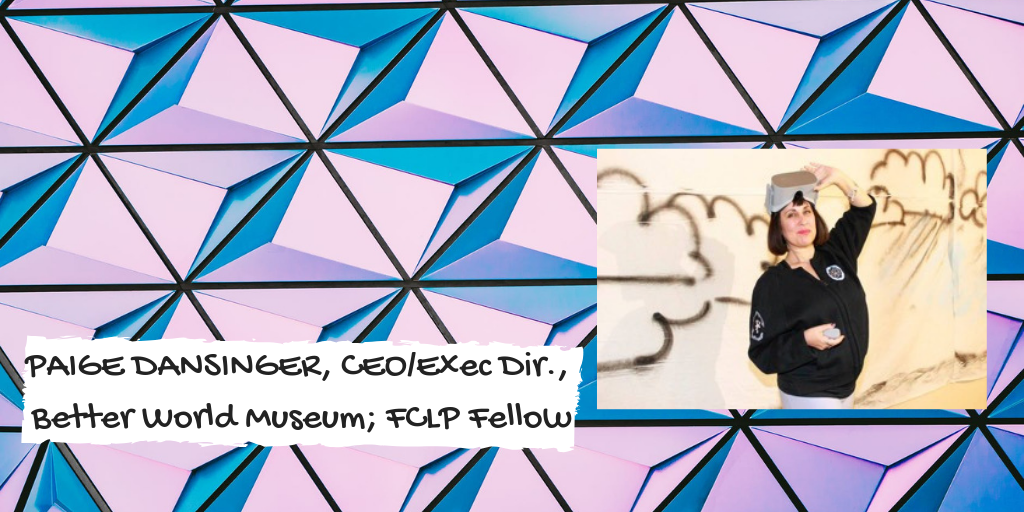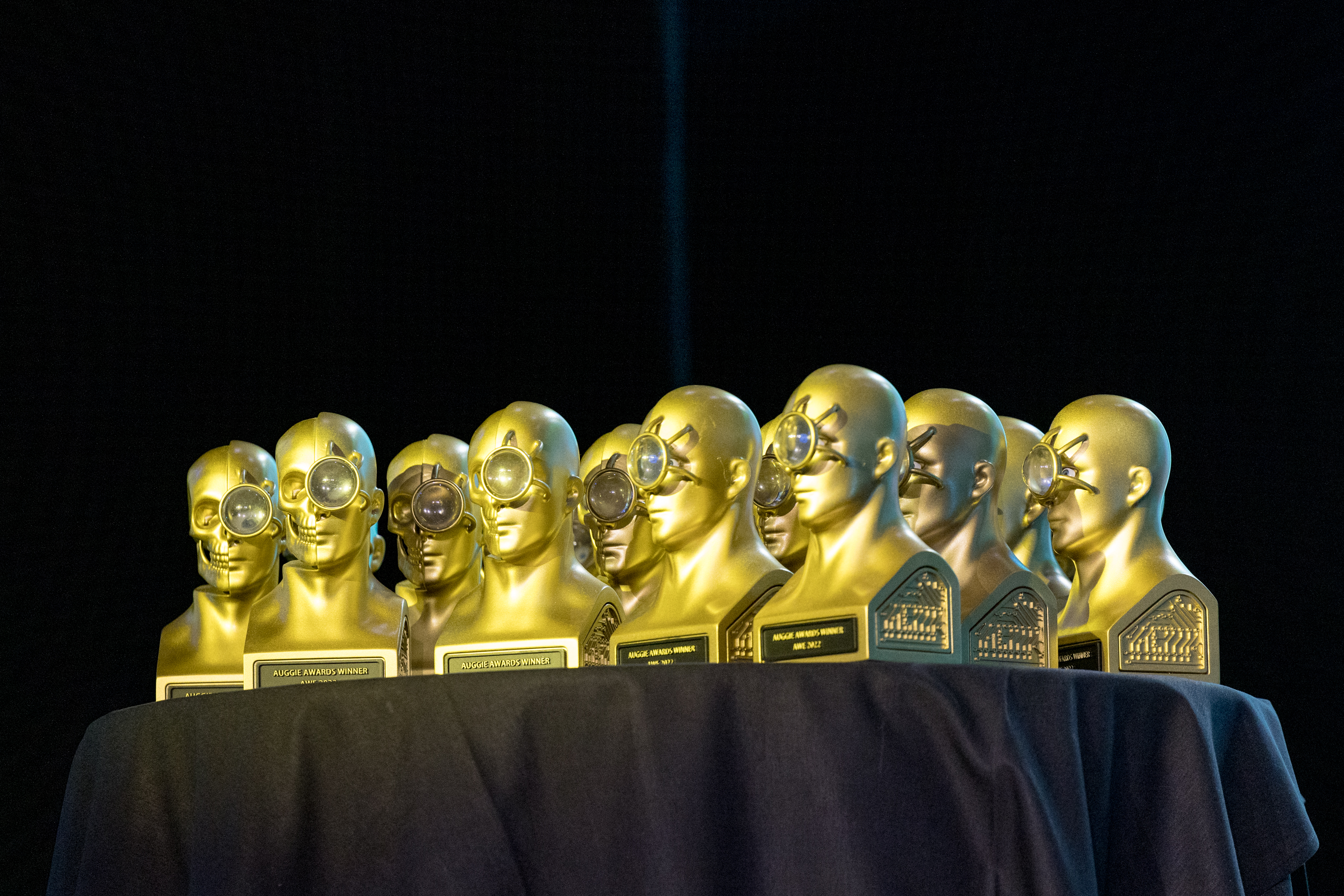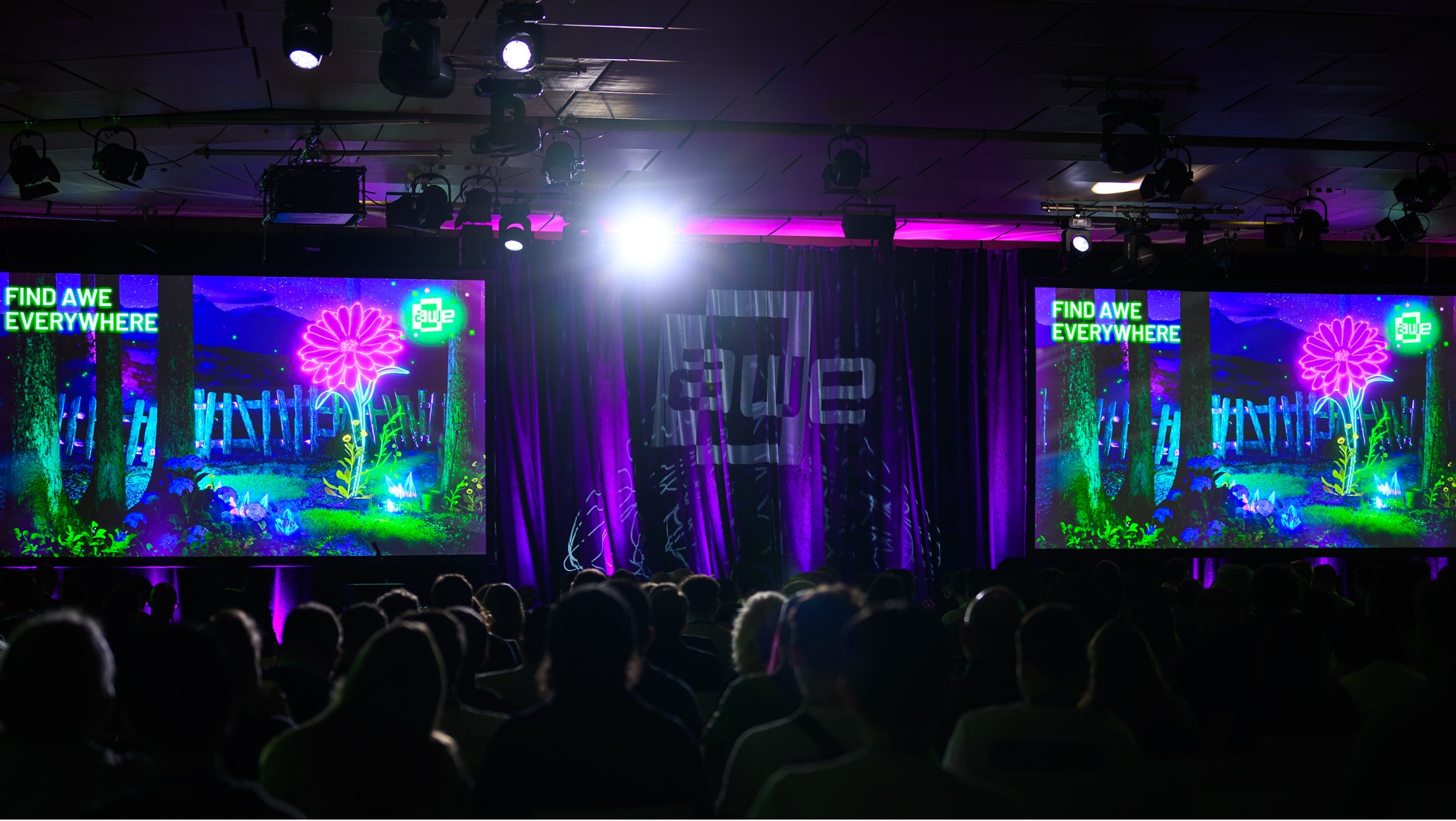When it comes to achieving gender equality, the technology industry is behind the U.S. economy as a whole. Women are paid less, receive less VC funding, and occupy fewer leadership and technical positions compared to men. So, for this Women's History Month, I am interviewing real women working in immersive tech, women who challenge the idea that the tech industry lacks visible female role models. Enjoy!
Emily: To begin, could you provide us with a little background on yourself and your career?
Paige: I'm founding director of Better World Museum and a new Facebook Community Leadership Program (FCLP) Fellow. I use AR/VR to create more inclusive communities by supporting vulnerable and overlooked voices. I developed VR Garden, a fun group drawing activity that draws people together for a better world and was the 2018 AR/VR Artist in Residence at the Minneapolis Athenaeum.
My first experience directing a creative VR project was in 2016, before I had ever tried a VR headset. The project involved 65 survivors of domestic violence, with the Better World Museum's creative tech team creating an empathy experience using an iPad HTML drawing program I had designed along with team member Hattie Ball using Unity and Maya. Ultimately, the project provided public space for vulnerable voices and influenced how I'm using AR/VR today.
Shortly after, the museum accepted a donation of an Oculus Rift and I created the first VR Garden. This is how I met Iva Leon and members of AR/VR Women and Allies. Iva is now Director of Growth at Better World Museum and an important part of my upcoming project for the FCLP, which demonstrates how VR can create meaningful relationships on and offline. Today, I use AR/VR in exciting ways: Having just returned from drawing in VR Garden with students and underserved teens in Cambodia and Singapore, I'm looking forward to creating a modular prototype for an AR/VR Climate Museum Pop-up (with Better World Museum) and working on my current side project--creating an AR/VR book of Urban Edible Plants.
Emily: What is it like as a woman working in AR/VR?
Paige: It's an advantage today, because I'm able to be selective as to who I support based on practices and principles that pave the way for more equity and inclusion. It's a perfect time to fill my museum board, leadership roles, and projects with diverse youth and emerging talent that may not have had the opportunity in the past because of structural racism, elitism or sexism.
I may receive less funding or opportunities, but I have the advantage of having so many talented women and allies to look to as role models and mentors to grow and develop my skills. I don't really have to depend on men for work. Respectfully, there are many good men out there, but today I'm proud to surround myself with mostly women professionals in AR/VR.
Emily: What challenges do you face that your male colleagues or peers don't?
Paige: I came on the VR scene during the #metoo movement. It made me more empathetic and sensitive to people in the AR/VR community, more mindful of what sources I share online, and who I connect with. Data shows women are massively underrepresented in technology and I want to be a part of the change.
Emily: Have you ever felt judged or overlooked because of your gender?
Paige: Yes, I have been on occasion. It drives me to work harder to create inclusive content, share human-centered stories, and use VR to repair the world.
Emily: What about the user experience for women? How do the devices fit and perform for women?
Paige: VR headsets do get heavy on my face, but I'm not sure that's a gender-specific design issue. I'd love to experience and drive content creation of more gender-related, diverse, and cultural storytelling, as well as museum and educational programs in the future -- again, this isn't specifically a gender issue, but should be an of-by-for all the people movement.
Emily: What is the most critical issue for women in AR/VR?
Paige: Equal opportunity, the pay gap, #metoo, leadership, lack of diversity...we still work in a male-centric world but that is changing...for the better.
Emily: Do you believe there's a lack of content for women AR/VR users?
Paige: There are so many exciting projects created by women. I'm a fangirl of the VR classroom initiatives by Kai M. Fraizer of Curated x Kai. I deeply respect the work of Moni Garr, who's dedicated to creating an Oculus Go program for Endangered Language Revival; and Siciliana Trevino Johnson, AR/VR Women and Allies Co-Founder and host of the amazing AR/VR Breakfast Fight Club in Berkley, SF. Other women who inspire me (and who you should know) are Chlorama Dorvilias, Charity Everett, Cathy Hackl, Lisa Kotecki, Navah Berg, Sherrie Robertson, Raquel Winz and Hattie Ball.
Emily: What is your advice to women working in AR/VR?
Paige: I feel that it's our responsibility to work towards ensuring more equitable, empathetic, and human-centered AR/VR content and opportunities for the next generation. Young women should ask themselves "So what?" about their work: Does your work give more than it takes? Does it help repair the world? I have hope today because young women, LGBTQ+, diverse, immigrant, and disabled people's voices are rising. Please make room for leadership and creative opportunities that break traditional barriers and use AR/VR to make a better world. Liking the Facebook group AR/VR Women and Allies is probably the smartest advice I can offer.
Emily: What would you like to say to men in the space? What should they be doing to help women in tech?
Paige: Right now, I really appreciate Mark Zuckerberg for creating the Facebook Community Leadership Program and supporting my community work with AR/VR at Better World Museum. Opportunities like FCLP provide mentorship and professional development that will help create sustainable AR/VR solutions to our most pressing issues today and create pathways to careers for women, allies and vulnerable people in AR/VR tech.
Emily: What's your greatest hope for the future of AR/VR?
Paige: My greatest hope is to see accessible public AR/VR museums in the centers of communities all over the world. Personally, I dream of becoming the next Bob Ross of VR drawing on Facebook Spaces and want to dedicate more time to focus on developing and learning how to animate in Quill. My greatest hope is that Facebook Spaces is on the new Oculus Quest!
*Meet up with Paige at AWE USA 2019, where she will be both speaking and volunteering!
Paige Dansinger, CEO/Executive Director, Better World Museum, and Facebook Community Leadership Program Fellow
Emily: To begin, could you provide us with a little background on yourself and your career?
Paige: I'm founding director of Better World Museum and a new Facebook Community Leadership Program (FCLP) Fellow. I use AR/VR to create more inclusive communities by supporting vulnerable and overlooked voices. I developed VR Garden, a fun group drawing activity that draws people together for a better world and was the 2018 AR/VR Artist in Residence at the Minneapolis Athenaeum.
My first experience directing a creative VR project was in 2016, before I had ever tried a VR headset. The project involved 65 survivors of domestic violence, with the Better World Museum's creative tech team creating an empathy experience using an iPad HTML drawing program I had designed along with team member Hattie Ball using Unity and Maya. Ultimately, the project provided public space for vulnerable voices and influenced how I'm using AR/VR today.
Shortly after, the museum accepted a donation of an Oculus Rift and I created the first VR Garden. This is how I met Iva Leon and members of AR/VR Women and Allies. Iva is now Director of Growth at Better World Museum and an important part of my upcoming project for the FCLP, which demonstrates how VR can create meaningful relationships on and offline. Today, I use AR/VR in exciting ways: Having just returned from drawing in VR Garden with students and underserved teens in Cambodia and Singapore, I'm looking forward to creating a modular prototype for an AR/VR Climate Museum Pop-up (with Better World Museum) and working on my current side project--creating an AR/VR book of Urban Edible Plants.
Emily: What is it like as a woman working in AR/VR?
Paige: It's an advantage today, because I'm able to be selective as to who I support based on practices and principles that pave the way for more equity and inclusion. It's a perfect time to fill my museum board, leadership roles, and projects with diverse youth and emerging talent that may not have had the opportunity in the past because of structural racism, elitism or sexism.
I may receive less funding or opportunities, but I have the advantage of having so many talented women and allies to look to as role models and mentors to grow and develop my skills. I don't really have to depend on men for work. Respectfully, there are many good men out there, but today I'm proud to surround myself with mostly women professionals in AR/VR.
Emily: What challenges do you face that your male colleagues or peers don't?
Paige: I came on the VR scene during the #metoo movement. It made me more empathetic and sensitive to people in the AR/VR community, more mindful of what sources I share online, and who I connect with. Data shows women are massively underrepresented in technology and I want to be a part of the change.
Emily: Have you ever felt judged or overlooked because of your gender?
Paige: Yes, I have been on occasion. It drives me to work harder to create inclusive content, share human-centered stories, and use VR to repair the world.
Emily: What about the user experience for women? How do the devices fit and perform for women?
Paige: VR headsets do get heavy on my face, but I'm not sure that's a gender-specific design issue. I'd love to experience and drive content creation of more gender-related, diverse, and cultural storytelling, as well as museum and educational programs in the future -- again, this isn't specifically a gender issue, but should be an of-by-for all the people movement.
Emily: What is the most critical issue for women in AR/VR?
Paige: Equal opportunity, the pay gap, #metoo, leadership, lack of diversity...we still work in a male-centric world but that is changing...for the better.
Emily: Do you believe there's a lack of content for women AR/VR users?
Paige: There are so many exciting projects created by women. I'm a fangirl of the VR classroom initiatives by Kai M. Fraizer of Curated x Kai. I deeply respect the work of Moni Garr, who's dedicated to creating an Oculus Go program for Endangered Language Revival; and Siciliana Trevino Johnson, AR/VR Women and Allies Co-Founder and host of the amazing AR/VR Breakfast Fight Club in Berkley, SF. Other women who inspire me (and who you should know) are Chlorama Dorvilias, Charity Everett, Cathy Hackl, Lisa Kotecki, Navah Berg, Sherrie Robertson, Raquel Winz and Hattie Ball.
Emily: What is your advice to women working in AR/VR?
Paige: I feel that it's our responsibility to work towards ensuring more equitable, empathetic, and human-centered AR/VR content and opportunities for the next generation. Young women should ask themselves "So what?" about their work: Does your work give more than it takes? Does it help repair the world? I have hope today because young women, LGBTQ+, diverse, immigrant, and disabled people's voices are rising. Please make room for leadership and creative opportunities that break traditional barriers and use AR/VR to make a better world. Liking the Facebook group AR/VR Women and Allies is probably the smartest advice I can offer.
Emily: What would you like to say to men in the space? What should they be doing to help women in tech?
Paige: Right now, I really appreciate Mark Zuckerberg for creating the Facebook Community Leadership Program and supporting my community work with AR/VR at Better World Museum. Opportunities like FCLP provide mentorship and professional development that will help create sustainable AR/VR solutions to our most pressing issues today and create pathways to careers for women, allies and vulnerable people in AR/VR tech.
Emily: What's your greatest hope for the future of AR/VR?
Paige: My greatest hope is to see accessible public AR/VR museums in the centers of communities all over the world. Personally, I dream of becoming the next Bob Ross of VR drawing on Facebook Spaces and want to dedicate more time to focus on developing and learning how to animate in Quill. My greatest hope is that Facebook Spaces is on the new Oculus Quest!
*Meet up with Paige at AWE USA 2019, where she will be both speaking and volunteering!



